MercoPress. South Atlantic News Agency
Tag: Donald Trump
-
Thursday, January 15th 2026 - 10:04 UTC
Trump to meet María Corina Machado after praising Delcy Rodríguez
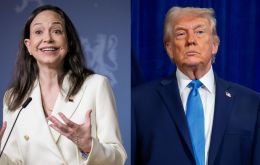
US President Donald Trump is set to meet on Thursday at the White House with Venezuelan opposition leader María Corina Machado, hours after publicly praising senior chavista official, and acting ruller, Delcy Rodríguez, calling her a “great person” and saying Washington “works very well” with her.
-
Wednesday, January 14th 2026 - 10:40 UTC
US military intervention in Iran more likely by the hour
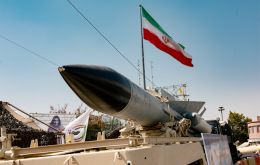
The White House signaled Tuesday a potential shift toward military intervention in Iran, as human rights monitors warned of a staggering death toll and imminent mass executions.
-
Tuesday, January 13th 2026 - 10:00 UTC
Trump spoils Lula's celebration of trade surplus with Iran

US President Donald Trump announced on Monday that any nation conducting business with Iran will face a 25% tariff on all trade with Washington, thus crushing earlier celebrations by Brazil's Luiz Inácio Lula da Silva, whose government proudly announced a substantial trade surplus with Tehran, totaling US$2.8 billion in 2025, driven by corn and soybeans.
-
Tuesday, January 13th 2026 - 03:17 UTC
Venezuelan serviceman recounts U.S. strike that disabled air defenses before Maduro capture

A Venezuelan serviceman stationed at the Meseta de Mamo military academy in La Guaira described the Jan. 3 U.S. bombardment as a rapid, overwhelming assault that “blinded” radar and electronic systems, preventing any organized defense. “There was no time to counterattack. They were very fast,” he said anonymously in an account published by La Hora de Venezuela and echoed by other Venezuelan outlets.
-
Monday, January 12th 2026 - 10:44 UTC
Delcy Rodríguez vows to rescue Nicolás Maduro through diplomacy
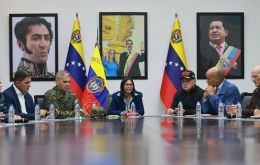
Venezuela's acting president, Delcy Rodríguez, has vowed to secure Nicolás Maduro's return while simultaneously opening a fragile diplomatic “exploratory process” with the United States.
-
Monday, January 12th 2026 - 10:15 UTC
Maduro down, Trump aims at Cuba

US President Donald Trump has issued a total oil embargo and a diplomatic ultimatum to Cuba, signaling a Venezuela-style transition coming up. It was even rumored that US Secretary of State could be Cuba's next President.
-
Saturday, January 10th 2026 - 10:24 UTC
Trump wants Greenland at any cost

US President Donald Trump insisted on Friday that his administration needed to take effective control of Greenland because otherwise Moscow or Beijing would do it. “By hook or by crook,” Washington needs to prevent it from falling under the influence of Russia or China, Trump explained to reporters at the White House.
-
Thursday, January 8th 2026 - 10:55 UTC
Venezuela's new oil revenues to be spent solely on US goods
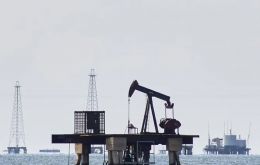
President Donald Trump on Wednesday announced that the proceeds from his country's future oil purchases from Venezuela under caretaker President Delcy Rodríguez will be spent entirely on US-made products, making Washington Caracas' new main trading partner instead of Moscow, Beijing, or Tehran.
-
Thursday, January 8th 2026 - 10:55 UTC
Trump invites Petro to White House following phone call
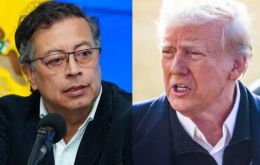
US President Donald Trump announced on Wednesday that he would host Colombian President Gustavo Petro at the White House in the coming days to resolve a “pre-war” climate between the two nations. The initiative was agreed upon after a telephone call between both leaders lasting over one hour.
-
Thursday, January 8th 2026 - 10:29 UTC
Rubio outlines three-phase plan for Venezuela's recovery

US Secretary of State Marco Rubio described on Wednesday before his country's Senate the President Donald Trump administration's three-phase plan for Venezuela’s political and economic future.
